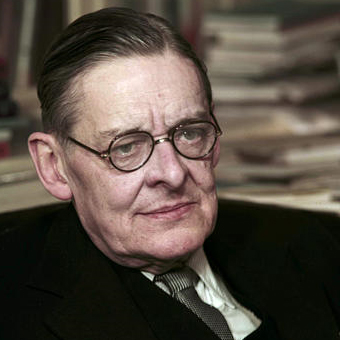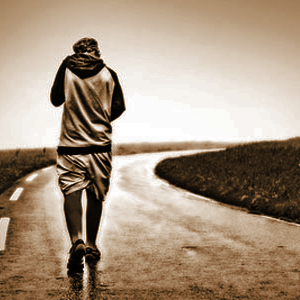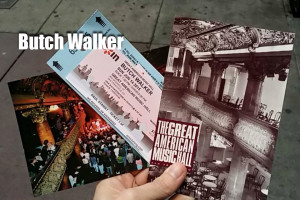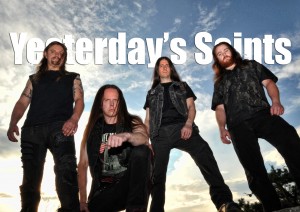Why You Should…Revisit T.S. Eliot
6 min read
[Ed. Note: “Why You Should…” is an ongoing series dedicated to illuminating and reintroducing cultural and artistic works of the past that you may have missed in the cacophony of the present. Audacious? Absolutely. Pretentious? Possibly. To be ignored? Only at your own intellectual peril…]
 What do we make of the world as it has become? What are the benefits and downfalls associated with the exponential, and arguably self-perpetuating, advances in technology? How do we negotiate the perhaps impossibly muddied moral waters of the ongoing military actions against terrorism (especially, and currently, in Iraq and Afghanistan) and the dark places it may have taken us? With increasingly unreliable television news reporting, incendiary conservative talk radio and the decline of the printed page suffocating any semblance of serious journalism in favor of “infotainment,” how does one even begin to pierce the fog of extreme and conspicuous subjectivity in an effort to at least glance at the facts of a matter? Is it possible to reconcile the desire for individualism and self-determination with a globalized world wherein a sneeze in Shanghai sends markets crashing on Wall Street? Earth in the 21st century is small, fast and dangerously/magnificently interconnected. Every few years I feel like I live in a new world, with the previous version obsolete. The 90s were not that long ago, but seeing pictures and footage from ’99 is like watching Lumiere brothers films. Things are changing quickly, maybe too quickly, and perhaps in society’s haste we have lost, or are in danger of losing, the soul; it may be, as Yeats feared, that “The falcon cannot hear the falconer; Things fall apart; the centre cannot hold.”
What do we make of the world as it has become? What are the benefits and downfalls associated with the exponential, and arguably self-perpetuating, advances in technology? How do we negotiate the perhaps impossibly muddied moral waters of the ongoing military actions against terrorism (especially, and currently, in Iraq and Afghanistan) and the dark places it may have taken us? With increasingly unreliable television news reporting, incendiary conservative talk radio and the decline of the printed page suffocating any semblance of serious journalism in favor of “infotainment,” how does one even begin to pierce the fog of extreme and conspicuous subjectivity in an effort to at least glance at the facts of a matter? Is it possible to reconcile the desire for individualism and self-determination with a globalized world wherein a sneeze in Shanghai sends markets crashing on Wall Street? Earth in the 21st century is small, fast and dangerously/magnificently interconnected. Every few years I feel like I live in a new world, with the previous version obsolete. The 90s were not that long ago, but seeing pictures and footage from ’99 is like watching Lumiere brothers films. Things are changing quickly, maybe too quickly, and perhaps in society’s haste we have lost, or are in danger of losing, the soul; it may be, as Yeats feared, that “The falcon cannot hear the falconer; Things fall apart; the centre cannot hold.”
What are the roots that clutch, what branches grow
Out of this stony rubbish? Son of man,
You cannot say, or guess, for you know only
A heap of broken images, where the sun beats,
And the dead tree gives no shelter, the cricket no relief,
And the dry stone no sound of water. (The Waste Land, lns 19-24)
 Modernism, as an aesthetic and philosophical expression, was the product of, from a certain perspective, a similar point in history. I am certain you are smart and you know how to use Wikipedia, and therefore do not need me to give an extensive historical context for the movement. Simply put, the late 19th though early 20th centuries brought abrupt and dramatic technological advancements, accompanied by World War I with its mustard gas, trench warfare, and nightmarish weaponry capable of massive demoniac destruction. During this time, the dominant moral, religious and philosophical foundations, based previously on certain traditional suppositions, became largely unmoored. Humanity and civilization had become anchorless, without perspective, and swimming in a sense of ubiquitous generalized anxiety. For a simple referential image of this philosophy, look at one of Picasso or Braque’s Cubist paintings, my favorite of which is Braque’s “Woman with a Guitar” (1913). In this work, multiple perspectives occupy the same space (as is a central concept in Cubism), yet there remains the vague perception of the subject. It is a disorienting, intellectually challenging work; it causes the viewer to question manifold assumptions about art, point of view, and value. As with all art, it exists as a reaction to, and a representation of, contemporaneous political realities.
Modernism, as an aesthetic and philosophical expression, was the product of, from a certain perspective, a similar point in history. I am certain you are smart and you know how to use Wikipedia, and therefore do not need me to give an extensive historical context for the movement. Simply put, the late 19th though early 20th centuries brought abrupt and dramatic technological advancements, accompanied by World War I with its mustard gas, trench warfare, and nightmarish weaponry capable of massive demoniac destruction. During this time, the dominant moral, religious and philosophical foundations, based previously on certain traditional suppositions, became largely unmoored. Humanity and civilization had become anchorless, without perspective, and swimming in a sense of ubiquitous generalized anxiety. For a simple referential image of this philosophy, look at one of Picasso or Braque’s Cubist paintings, my favorite of which is Braque’s “Woman with a Guitar” (1913). In this work, multiple perspectives occupy the same space (as is a central concept in Cubism), yet there remains the vague perception of the subject. It is a disorienting, intellectually challenging work; it causes the viewer to question manifold assumptions about art, point of view, and value. As with all art, it exists as a reaction to, and a representation of, contemporaneous political realities.
The river sweats
Oil and tar
The barges drift
With the turning tide
Red sails
Wide
To leeward, swing on the heavy spar. (266-272)
The poetry of the incomparable T.S. Eliot is, arguably (though not many would argue), a poetic manifestation (though not precisely so) of the Cubist philosophy of representation in art. If you have ever waded through the dense High Modernism of Eliot’s most famous The Waste Land (1922), my personal favorite The Hollow Men (1925), or his deeply religious Ash Wednesday (1930), which followed his conversion to the Anglican Church, then you are familiar with how difficult and fragmentary his poetry can be. Don’t feel bad – scholars can, and do, spend their entire lives sifting through the countless allusions (and allusion buried within allusion) that seem to reach across all of human language and art, as if Eliot’s encyclopedic knowledge of poets, theologians, languages, and philosophers, knows no ceiling or depth. This accumulation of weight and knowledge makes a poem like The Waste Land feel as if it contains all things – all wisdom, all complexity, all truth; it feels like an ancient, foundational artifact of human existence. Yet this foundation, which Eliot does not deny (as we might see in some Post-Modern thought) as existing, is obfuscated (perhaps hopelessly so) by irreparably broken systems of human creation. Eliot sees civilization as lying in fragmented ruin; its life sapped, its soul deadened, its compass without a pole to be guided by. As in the Braque painting, meaning can be seen as the woman with the guitar, but the subject is marred, or complicated, by shards of perspective.
If there were water
And no rock
If there were rock
And also water
And water
A spring
A pool among the rock
If there were the sound of water only
Not the cicada
And dry grass singing… (346-354)
Since this “marring” seems to be inherent in human nature, we might say that Eliot (as well as his philosophical peers) is perpetually relevant: certainly in the 20s, the 40s, the 60s and early 70s, as well as during the height of the Cold War. Yet, here I contend that Eliot and Modernist expressions may be more significant now than at any time in American history since Vietnam. Confronted with the same existential questions about American (and frankly, but too broadly, the world) identity (as good or bad, just or unjust, Imperialistic aggressor or as Graham Greene’s Quiet American) we are left with the same sense of confusion. As in Vietnam, we are asked to consider whether or not we should be prepared to sacrifice our supposed values in order to defeat an enemy that is wily and anarchic. As in World War I, we have slid into an age of technological advancement that is so fast, so all consuming, that it is simply inescapable. Though I type this article on a nifty Mac computer I cannot help but wonder, like the French social critic and Christian anarchist Jacques Ellul, if “we take on every new technology without once wondering about its possible harmfulness” (Conversation with Patrick Troude-Chastenet, 118). The question must be asked: are we still in control of technology? Eliot wondered the same thing of the rapid development of technological wonders in his day. Related is information distribution in the modern West, especially as we see in the United States. Twenty-four hour news, highly specific ideology driven web sources and the amalgamation of politics/journalism with entertainment, have even further confused and clouded any sense of truth. Refraction and obfuscation are everywhere one looks.
Unreal city,
Under the brown fog of a winter dawn,
A crowd flowed over London Bridge, so many,
I had not thought death had undone so many. (60-63)
Let’s face one fact (if the term “fact” even means anything): total objectivity was never possible for the human mind and, depending on your theological framework, human civilization has never been Edenic. This is something the Post-Modernists have gotten absolutely correct. Indeed, experience, a multiplicity of prisms, and external impositions have always, always, prevented us from seeing anything without subjectivity. Yet technology and human nature – combined – continue to propel us further away from any semblance of foundational understanding, be it religious, philosophical or even humanistic. Are you trying to make sense of the torn-asunder puzzle of the 21st century world? Are you looking for a way to represent the confusion, fear, and moral uncertainty of an America under the War on Terrorism? The reality is, there is no way to represent such complexity in its totality. Occasionally, it seems the best course is an attempt at manifesting, or reflecting, the world in which we live. It can be more satisfying and comforting; it can be more intellectually honest and cathartic. Personally, and currently, I have been going back to Modernism. I have been going back to T.S. Eliot and the like. And, if you’d like, I suggest you give it a try as well.
I sat upon the shore
Fishing, with the arid plain behind me
Shall I at least set my lands in order? (423-425)







Excellent piece. Eliot was probably the first Modernist poet I ever read, in high school, and while it’s been a good while since I’ve sat down with “The Love Song of J. Alfred Prufrock,” it’s one of those core poems that comes to mind when I think about what poetry can do at its best.